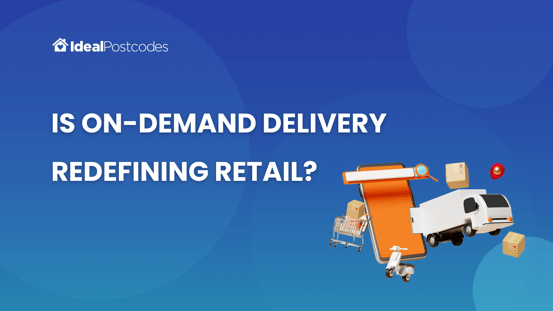Is on-Demand Delivery Redefining Retail?

The pandemic accelerated the adoption of quick commerce, also known as q-commerce, which refers to the fast delivery of goods typically on the same day. What started as a luxury convenience has quickly become an essential service that more retailers are embracing to stay competitive.
Our desire for instant gratification and mobile apps that enable seamless ordering fuel q-commerce growth. Retailers also recognise that convenience and rapid fulfilment give them a distinct edge over the competition.
Q-Commerce
During the COVID-19 pandemic, q-commerce gained traction by focusing on grocery, meal, and essential household items. While grocery remains a major category, more retailers of consumer electronics, sporting goods, pet supplies, health/beauty products, and fashion now offer quick delivery fulfilment. Customers can now receive a new phone charger or set of headphones within an hour instead of waiting days for delivery.
These aren’t the only convenience items being ordered. The scale of urgent consumer needs being met through q-commerce represents a shift, especially in healthcare. Pharmacies are providing customers with life saving, important medications. The level of innovation shows no signs of slowing down.
What’s Driving Growth?
-
Consumer appetite for speed and convenience continues to rise. Mobile technology and easy-to-use apps enable one-touch ordering, tracking, and communication.
-
Growing demand for flexible work has increased the pool of delivery partners that power on-demand capacity. Platforms like Uber Eats offer people supplementary incomes. This relationship enables fast delivery at scale.
-
Businesses can also expand without developing delivery infrastructure by partnering with third-party delivery services.
Types of Q-commerce
Q-commerce companies fall into one of three categories, each with different operating models.
Startups: Offering the quickest delivery times, usually 10-25 minutes, the startups operate small dark stores deep in residential areas. They manage end-to-end operations using their own platform and employee network.
Aggregators: Deliveroo and Uber Eats are frontrunners in leveraging their existing delivery infrastructure. They partner with grocers and retailers to take orders on their platforms. Orders are prepared by partners and collected by the aggregators’ drivers for delivery in 20-60 mins.
Retailers: Major grocers like Tesco and Sainsbury’s have now launched their own q-commerce platforms, typically offering 60 minute delivery. After eGrocery finally becoming profitable from higher basket values, new models are needed to make q-commerce work financially. Partnering with aggregators helps scale while managing their own operations.
Optimising Delivery
Managing logistics for speed and efficiency is crucial but poses challenges. Inventory must be coordinated to balance availability and waste. In addition, congestion in densely populated areas also risks slowing delivery times. This is where accurate address validation and location data help with cost savings and growth opportunities.
Address validation verifies if an address is deliverable and gathers complete data such as UPRNs and geo-coordinates to improve routing. Shorter travel distances achieved through better location data improve productivity by 15-20%. Valid addresses also improve deliverability and reduce failed deliveries.
Ideal Postcodes is a trusted provider of global address validation services, offering accurate and comprehensive data to help businesses enhance their products and operations.
Want to learn more about how address validation can drive growth? Get in touch today.
